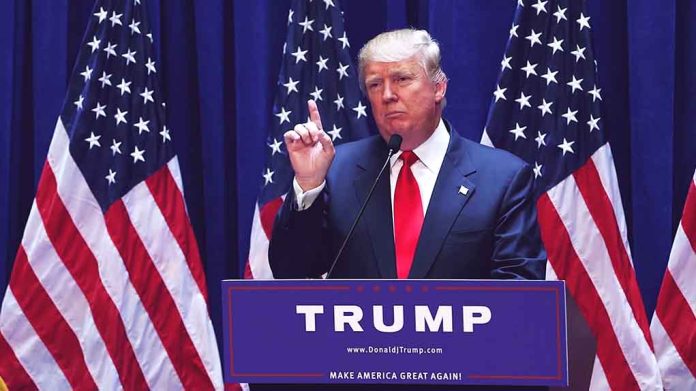
President-elect Donald Trump urges Senate Republicans to use recess appointments for swift Cabinet fillings, potentially bypassing traditional confirmation processes.
At a Glance
- Trump is urging Senate GOP leadership candidates to allow recess appointments.
- Republicans have regained control of the Senate, opening the possibility for this strategy.
- Senators John Thune, John Cornyn, and Rick Scott are vying to replace Mitch McConnell as GOP leader.
- Trump aims to quickly fill crucial positions like defense and homeland security secretaries.
- The move could face opposition from Democrats and debates over pro forma sessions.
Trump’s Push for Recess Appointments
In a bold move following his recent election victory, President-elect Donald Trump is advocating for the use of recess appointments to expedite the filling of key Cabinet positions in his incoming administration. This strategy, if implemented, would allow Trump to bypass the traditional Senate confirmation process, potentially accelerating the placement of crucial officials such as the defense secretary and homeland security secretary.
Trump’s push comes in the wake of Republicans successfully reclaiming control of the Senate, creating an opportunity for this unconventional approach. The President-elect has made his intentions clear, stating his expectations for the new Republican Senate leadership.
Any Republican Senator seeking the coveted LEADERSHIP position in the United States Senate must agree to Recess Appointments (in the Senate!), without which we will not be able to get people confirmed in a timely manner. Sometimes the votes can take two years, or more. This is…
— Donald J. Trump (@realDonaldTrump) November 10, 2024
Senate Leadership Race and Recess Appointments
The race for Senate Republican leader is heating up, with Senators John Thune, John Cornyn, and Rick Scott competing to replace Mitch McConnell. Trump has not endorsed a specific candidate but has made his expectations clear regarding recess appointments. This has put pressure on the leadership contenders to align with Trump’s strategy.
The candidates have responded to Trump’s call with varying degrees of enthusiasm. Senator Rick Scott has shown full support, and Senator John Thune has emphasized the need for quick action on cabinet and nominee confirmations without explicitly endorsing recess appointments.
Potential Challenges and Opposition
While Trump’s strategy has garnered support from some Republican senators, it faces potential hurdles. The Senate has not allowed recess appointments since a 2014 Supreme Court ruling, and Democrats are likely to oppose such a move. Additionally, the use of pro forma sessions to prevent recess appointments could become a point of contention.
“It is unacceptable for Senate Ds to blockade President @realDonaldTrump’s cabinet appointments. If they do, we will stay in session, including weekends, until they relent,” said Senator John Cornyn of Texas.
Trump has also advised Republicans to block Democrats from confirming judges before the new Senate term begins, further escalating tensions between the parties. This approach reflects Trump’s determination to swiftly implement his agenda and fill key positions in his administration.
Looking Ahead
As the transition to the new administration progresses, the debate over recess appointments and the speed of cabinet confirmations is likely to intensify. Trump’s team has already begun making personnel announcements, with Susie Wiles named as chief of staff. However, the President-elect has ruled out certain individuals, including Mike Pompeo and Nikki Haley, for top positions.
The coming weeks will be crucial in determining whether Trump’s push for recess appointments gains traction among Senate Republicans and how Democrats respond to this unconventional approach. The outcome of this debate could significantly impact the early days of Trump’s second term and the overall functioning of his administration.








